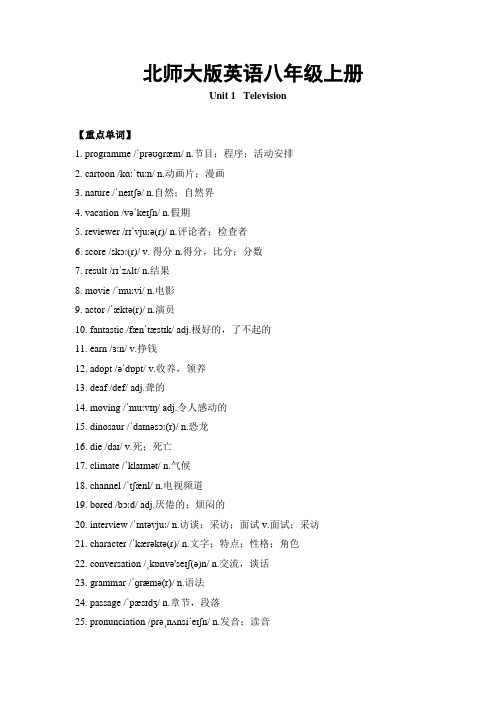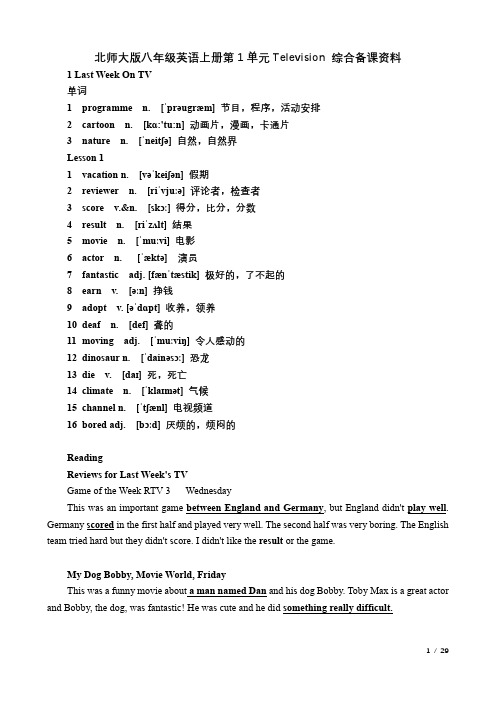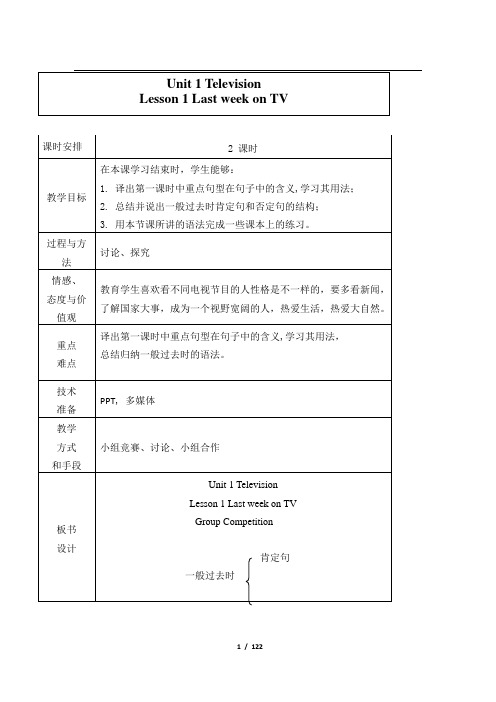新北师大版八年级英语上册Unit 1 Television Lesson 2 An Interview on TV 第2课时精品课件
北师大版八年级英语上册Unit 1 Lesson 2 An Interview on TV教案

Unit 1 Lesson 2 An Interview on TV 教案Teaching aims:1. 让学生了解语言学习的现状及重要性。
2. 进行课堂听力训练,提高学生英语听力能力。
3. 将课文主题与生活紧密联系,培养学生在生活中学习英语、运用英语的能力。
4. 通过学习让学生能够熟练运用一般过去时的一般疑问句与答句的表达。
Key points:重点学习一般过去时的一般疑问句与答句。
Difficult points:引导学生在活动中、生活中灵活运用句型,培养学生英语听、说能力。
Teaching preparations:PPT, cards, pictures, recorder.Teaching procedures:Step 1: Warm-up1. Greeting:T: Good morning, girls and boys. What TV programmes did you watch last night?2. Lead-inLook at the key words. Choose the correct words to complete the sentences on the right. Key Words: Language learningcharacters conversation grammarlistening passage pronunciationreading speaking vocabulary writing1) She speaks English very well. Her is quite good.2) He is learning to write Chinese .3) Sometimes rules are hard to remember.4) I just read an interesting in an old book.5) We had a long about the interview on the internet.Step 2: Listening1. Listen to the first part of the interview and answer the question.1) When did Tina come to Beijing?2) Did Tina like her teacher?3) What did Tina do in her Chinese class?2. Listen to the second part of the interview and complete the notes about James.3. Listen to the whole interview and write Tina, James or Tina &James in each blank.Step 3: Grammar1. Look at the table and circle the correct words.2. Pair work: make yes/no questions about James. Ask and answer in pairs. Example:A: Did he see a Chinese book in his cousin’s room?B: Yes, he did.Step 4: SpeakingT: Work in pairs. Talk about your own English learning experience.-When did you begin learning English?-What did you do in your English class?-What did you do after class?-What helped you learn English?Example:A: In English class, I usually listen to the teacher carefully. B: Me too. Taking notes is also very important.Step 5: Homework1. Memory all the key words and expressions.2. Talk about your opinion on language learning.。
初中英语北师大版八年级上册《Unit 1 Television Lesson 3 The Big G

6. Wow! Our team is playing really well.
Make sentences with the words and add the exclamations.
Example A: She kicked the ball and make a goal. B: How exciting!
1 she/kick the ball/make a goal 2 I/forget/homework 3 My dad/lose/car keys 4 she/fall/hurt her arm 5 Our team/win the game
Check the answers.
1 She kicked the ball and made a goal.
5 Our team won the game. How exciting!
Pair work
Example
A: My dad lost his c!
Pronunciation: /I/,/I:/
/I/: Tim, sister, tennis, is, bigger, easily /I:/: Tina weaker easily
Key Expressions
Wow!What a great kick! Are you kidding me? What a shame! Can you believe that? How exciting!
What+名词!
How +形容词/副词!
Circle the improper exclamations.
最新北师大版八年级英语上册课件:Unit 1 Television Lesson 2 An Interview on TV 第2课时

最新初中英语精品课件设计
肯定句
否定句
Germany scored The English team in the first half. didn’t score.
+动词过去式
didn’t+动词原形
一般疑问句 Did Tina like her teacher?
Did
最新初中英语精品课件设计
4 James didn’t use Chinese for many years. _W__h_o_d_i_d_n_’_t_u_s_e_C__h_in_e_s_e_f_o_r_m__a_n_y__y_e_a_rs_?
-When did you begin learning English? -I began learning English… -What did you do in your English class? -I… -What did you do after class? -I… -What helped you learn English? -…helped me learn English.
4. Did he enjoy his Chinese class? Yes, he did.
7 Write wh-questions about the underlined words.
1 Tina came to Beijing in 2008. _W__h_e_n_d_i_d_T__in_a__c_o_m_e__to__B_e_i_ji_n_g_?
6. Make yes / no questions about James.
Example
1. see a Chinese book in his cousin’s room?
北师大版英语八年级上册Unit 1 Television重难点知识归纳总结

北师大版英语八年级上册Unit 1 Television【重点单词】1. programme /ˈprəʊɡræm/ n.节目;程序;活动安排2. cartoon /kɑːˈtuːn/ n.动画片;漫画3. nature /ˈneɪtʃə/ n.自然;自然界4. vacation /vəˈkeɪʃn/ n.假期5. reviewer /rɪˈvjuːə(r)/ n.评论者;检查者6. score /skɔː(r)/ v. 得分 n.得分,比分;分数7. result /rɪˈzʌlt/ n.结果8. movie /ˈmuːvi/ n.电影9. actor /ˈæktə(r)/ n.演员10. fantastic /fænˈtæstɪk/ adj.极好的,了不起的11. earn /ɜːn/ v.挣钱12. adopt /əˈdɒpt/ v.收养,领养13. deaf /def/ adj.聋的14. moving /ˈmuːvɪŋ/ adj.令人感动的15. dinosaur /ˈdaɪnəsɔː(r)/ n.恐龙16. die /daɪ/ v.死;死亡17. climate /ˈklaɪmət/ n.气候18. channel /ˈtʃænl/ n.电视频道19. bored /bɔːd/ adj.厌倦的;烦闷的20. interview /ˈɪntəvjuː/ n.访谈;采访;面试 v.面试;采访21. character /ˈkærəktə(r)/ n.文字;特点;性格;角色22. conversation /ˌkɒnvə'seɪʃ(ə)n/ n.交流,谈话23. grammar /ˈɡræmə(r)/ n.语法24. passage /ˈpæsɪdʒ/ n.章节,段落25. pronunciation /prəˌnʌnsiˈeɪʃn/ n.发音;读音26. vocabulary /vəˈkæbjələri/ n.词汇,词汇量27. quite /kwaɪt/ adv.相当28. rule /ruːl/ n.规则29. experience /ɪkˈspɪərɪəns/ n.经验;实践 v.经历;体验30. carefully /'keəfəlɪ/ adv.仔细地31. field /fiːld/ n.运动场;田地32. extremely /ɪkˈstriːmli/ adv.极其;非常33. fit /fɪt/ adj.健壮的,健康的 v.适合;合身34. agree /əˈɡriː/ v.同意;赞成35. certainly /ˈsəːt(ə)nli/ adv.当然;确定36. pass /pɑːs/ v.传球;传递37. goal /ɡəʊl/ n.射门,进球得分;目标38. kick /kɪk/ n., v.踢39. basket /ˈbɑːskɪt/ n.投篮得分;篮子40. foul /faʊl/ n., v.犯规41. kid /kɪd/ v.开玩笑 n.小孩42. call /kɔːl/ n.(裁判员的)判决;电话 v.打电话;把……叫做43. terrible /ˈterəbl/ adj.非常讨厌的;可怕的44. shame /ʃeɪm/ n.令人遗憾的事;羞耻,羞愧45. should /ʃəd/ v.应该,应当46. complain /kəmˈpleɪn/ v.抱怨;埋怨47. hit /hɪt/ v.击(球) n.打;击48. court /kɔːt/ n.球场;法庭49. form /fɔːm/ n.表现状态;形式;表格 v.组成;产生;组织50. win /wɪn/ v.获胜,赢51. break /breɪk/ v.弄破,(使)破;中断 n.间歇52. prize /praɪz/ n.奖;奖金53. lose /luːz/ v.遗失,丢失54. fall /fɔːl/ v.跌倒;落下 n.落下;秋天55. magic /ˈmædʒɪk/ n.魔法;魔术 adj.神奇的;有魔力的56. tortoise /ˈtɔ:təs/ n.乌龟57. deer /dɪə(r)/ n.鹿58. sky /skaɪ/ n.天空59. whale /weɪl/ n.鲸60. ocean /ˈəʊʃn/ n.大海,海洋61. photographer /fəˈtɒɡrəfə(r)/ n.拍照者,摄影师62. cameraman /ˈkæmrəmæn/ n.摄影师63. host /həʊst/ n.主持人;主人;主办地 v.主持64. explain /ɪk'spleɪn/ v.解释;说明65. habit /ˈhæbɪt/ n.习惯66. scenery /ˈsiːnəri/ n.风景,景色67. explanation /ˌekspləˈneɪʃn/ n.说明;解释68. continue /kənˈtɪnjuː/ v.持续;继续【重点短语】1. take notes 记笔记2. score a goal 进了一个球,得一分3. make a basket 投中一球4. in top form 状态很好5. run after 追逐6. in the vacation 在假期中7. the first half 上半场8. the second half 下半场9. go to university 上大学10. play games 玩游戏11. complain about 投诉,抱怨12. make a goal 得一分13. learn about 了解;学习14. fall asleep 入睡;睡着15. give up 放弃16. on weekends 在周末17. turn on 打开18. get close to 接近19. every part of the world 世界各地【重点句型】1. What a shame!真遗憾!2. The English team tried hard but they didn’t score.英国队很努力了,但他们没有得分。
北师大版英语八年级上册Unit1Lesson2AnInterviewonTV(第二课时)教学设计

四、教学内容与过程
(一)导入新课
1.教师播放一段关于成功人士的电视访谈视频,引导学生关注访谈中的英语表达和句型。
2.视频播放完毕后,教师提出问题:“What did you learn from the video? Can you share some key words or sentences you heard?”,让学生分享他们从视频中获取的信息。
2.理解并运用一般现在时和现在进行时描述人物正在进行的动作和状态。
3.学会使用电视访谈的基本句型,如:“What is your dream?”, “How do you achieve your goal?”, “Can you tell us about your experience?”等,进行简单的访谈活动。
4.词汇巩固:整理本节课学到的词汇和短语,如:successful, achieve, goal, dream, work hard, never give up等,并尝试用它们造句。
5.家庭互动:与家人分享本节课的学习内容,向他们介绍一般现在时和现在进行时的用法。并尝试用这两种时态与家人进行简单的英语对话。
4.通过学习成功人士的经历,激发学生的内在动力,培养积极向上的生活态度。
二、学情分析
八年级学生经过七年级的学习,已经具备了一定的英语基础,对英语学习有了一定的认识和兴趣。在此基础上,他们对本课内容的学习有以下特点:
1.知识储备:学生已经掌握了基本的词汇和语法,能够进行简单的英语交流。但在实际运用中,对一般现在时和现在进行时的运用还不够熟练,需要在本节课中进行巩固和提高。
北师大版英语八年级上册Unit1Lesson2AnInterviewonTV(第二课时)教学设计
北师大版英语八上同步教学 Unit 1 Lesson 2 An Interview on TV 课件

What did he do yesterday? He played football yesterday.
What did she do last weekend?
Did she…? Yes, she did. No, she didn’t.
She cleaned the house /did the housework last weekend.
新课学习
Listening
1. Listen to the first part of the interview and answer the question. 1) When did Tina come to Beijing?
Tina came to Beijing in 2008 2) Did Tina like her teacher?
RHale Waihona Puke viewRead and pay attention to the verbs.
1. When did Tina come to Beijing? 2. Did Tina like her teacher? 3. What did Tina do in her Chinese class?
Make an interview (采访).
Yes, she did. 3) What did Tina do in her Chinese class?
She sometimes played games in her Chinese class
What did he do yesterday?
Did he …? Yes, he did. No, he didn’t.
课堂总结
What have we learned in this class? 单词: characters, conversation, grammar, listening, passage, pronunciation, reading, speaking, vocabulary,writing 语法: 动词过去式的变化规则 一般过去时的一般疑问句和特殊疑问句
北师大版八年级英语上册第1单元Television 综合备课资料

北师大版八年级英语上册第1单元Television 综合备课资料1 Last Week On TV单词1programme n. [ˈprəugræm] 节目,程序,活动安排2cartoon n. [kɑ:'tu:n] 动画片,漫画,卡通片3nature n. [ˈneitʃə] 自然,自然界Lesson 11vacation n. [vəˈkeiʃən] 假期2reviewer n. [riˈvjuːə] 评论者,检查者3score v.&n. [skɔː] 得分,比分,分数4result n. [riˈzʌlt] 结果5movie n. [ˈmuːvi] 电影6actor n. [ˈæktə] 演员7fantastic adj. [fænˈtæstik] 极好的,了不起的8earn v. [əːn] 挣钱9adopt v. [əˈdɑpt] 收养,领养10deaf n. [def] 聋的11moving adj. [ˈmuːviŋ] 令人感动的12dinosaur n. [ˈdainəsɔː] 恐龙13die v. [daɪ] 死,死亡14climate n. [ˈklaɪmət] 气候15channel n. [ˈtʃænl] 电视频道16bored adj. [bɔːd] 厌烦的,烦闷的ReadingReviews for Last Week's TVGame of the Week RTV 3 WednesdayThis was an important game between England and Germany, but England didn't play well. Germany scored in the first half and played very well. The second half was very boring. The English team tried hard but they didn't score. I didn't like the result or the game.My Dog Bobby, Movie World, FridayThis was a funny movie about a man named Dan and his dog Bobby. Toby Max is a great actor and Bobby, the dog, was fantastic! He was cute and he did something really difficult.People TBC, SaturdayThis was about a great mother. Sara Masters didn't earn much, but she adopted twelve deaf children. They love her very much. It was moving.Nature FTV 6 ,SundayLast week programme was about the world of dinosaurs. Some scientists think they died because they didn't have any food after t he climate changed.The program was very interesting.重点短语 / sports/ nature programme 电视/运动/自然节目2.between…and… 在…和…之间This was an important game between England and Germany3.in the vacation 在假期里6. an important game 一场重要的比赛5. play well 踢得好England didn't play well.6. Can I have the bill, please? 请给我账单好吗?7.earn / make money 赚钱8.score in the first half在上半场得分Germany scored in the first half9. a man named Dane 一个叫Dane的人This was a funny movie about a man named Dan and his dog Bobby.10.do something difficult做有难度的事情he did something really difficult.11.be interested in sth对…感兴趣I am interested the interesting Nature Programme.12.The game is interesting. 这个游戏很有趣。
北师大版初中八年级英语上册全套教案

Unit 1 Television Lesson 2 An Interview on TVUnit 1 TelevisionLesson 4 Communication Workshop【教材分析】本单元的话题为电视节目、语言学习经历、体育与赛事。
在本单元第1—3课学生通过阅读和听力活动进行了相关内容的语言学习和初步应用。
前三个输入课的学习,学生通过阅读,获取了上周电视节目和体育与赛事的相关语言信息;通过听力,学习了对Tina和James 的采访,从而了解他们语言学习经历的信息。
在本课,学生要综合使用本单元所获取的有关的词汇和语言信息,以书面形式介绍并评价自己最喜爱电视节目。
此话题贴近学生生活,是学生较为熟悉的话题。
从哪几个方面表达和如何正确运用一般过去时态表达是学生存在困难的地方。
本课的教学设计分为两课时,第一课时学生通过阅读获取与写作相关的语言信息。
引导学生关注文章结构和语言表达,通过小组合作的方式,讨论完善写作提纲。
在第二课时,引导学生进行写作自评和互评,学会欣赏他人作品。
学生根据评价,自己修改文章,完成写作作品。
最后,学生和同伴在写作的基础上,展开关于对喜爱的电视节目的讨论和交流。
【教学内容】话题:电视节目学习内容:阅读Jack的博客获取有关谈论自己喜爱的节目的信息;阅读:通过使用不同的阅读策略,获取文本主要信息,关注文章结构和目标语言;写作:模仿范文结构,列出提纲,进行写作、评价和修改;口语表达:介绍自己最喜爱的电视节目并评价。
【教学目标】在本课学习结束时,学生能够:1. 通过阅读范文,获取有关Jack的最喜爱的电视节目信息;2. 在范文中找出自己写作任务中所需要的内容语言,丰富自己的相关话题的表达语言;3. 分析和归纳范文结构;4. 列出写作提纲。
【教学过程】。
- 1、下载文档前请自行甄别文档内容的完整性,平台不提供额外的编辑、内容补充、找答案等附加服务。
- 2、"仅部分预览"的文档,不可在线预览部分如存在完整性等问题,可反馈申请退款(可完整预览的文档不适用该条件!)。
- 3、如文档侵犯您的权益,请联系客服反馈,我们会尽快为您处理(人工客服工作时间:9:00-18:30)。
肯定句
否定句
Germany scored The English team in the first half. didn’t score.
+动词过去式
didn’t+动词原形
一般疑问句 Did Tina l3;动词原形…?
一般疑问句 Did Tina like her teacher?
Did
+动词原形…?
Did you enjoy / enjoyed it?
Did you enjoy it?
When did you come / came to Beijing? When did you come to Beijing?
6. Make yes / no questions about James. Example
3 James went to university in the US. Where did James go to university _______________________________? 4 James didn’t use Chinese for many years. Who didn’t use Chinese for many years __________________________________?
2. Did he learn Chinese in high school? No, he didn’t. 3. Did he go to university? Yes, he did. 4. Did he enjoy his Chinese class? Yes, he did.
7 Write wh-questions about the underlined words. 1 Tina came to Beijing in 2008. When did Tina come to Beijing ___________________________? 2 She sometimes played games in Chinese class. _________________________________ What did she sometimes do in Chinese ______? class
-When did you begin learning English? -I began learning English… -What did you do in your English class? -I… -What did you do after class? -I… -What helped you learn English? -…helped me learn English.
1. see a Chinese book in his cousin’s room?
A: Did he see a Chinese book in his cousin’s room? B: Yes, he did.
2. learn Chinese in high school? 3. go to university? 4. enjoy his Chinese class?
